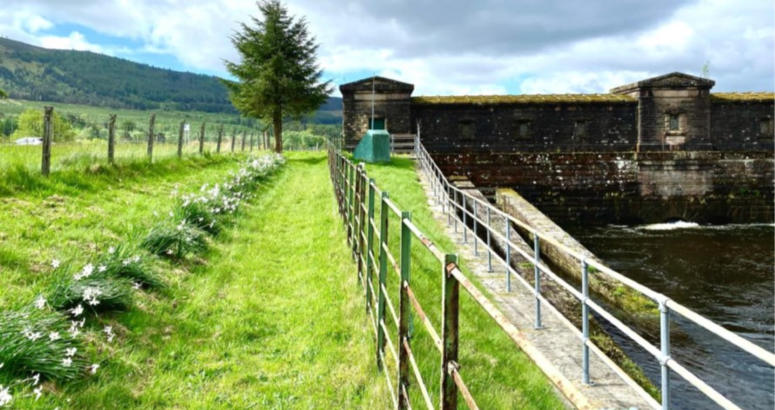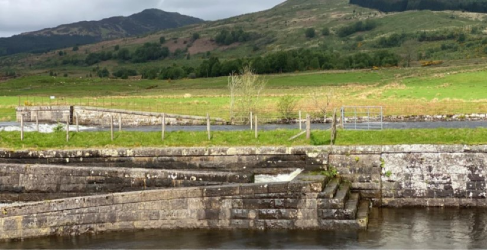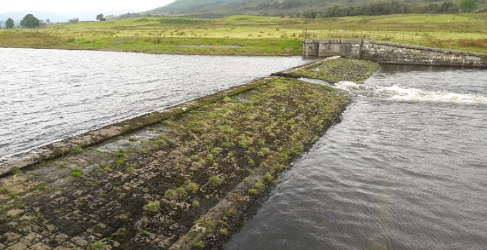Blast From the Past for £450,000 Dam Renovation
08 August 2022
Historic Structure
Built in 1857 the dam and sluice house still play an important role in the water network supplying Glasgow and the west of Scotland
Original masonry set aside during previous renovations is to be used to help safeguard an historic 165-year-old dam considered one of the most ambitious and advanced of its time.
We have applied for Listed Building Consent to carry out £450,000 of flood improvement works on the dam and sluice house of Loch Venachar near Callander.
A compensation reservoir, its dam and sluice house were built in 1857 as part of the Glasgow Corporation works to bring water to Glasgow from Loch Katrine.
Senior reservoir engineer Ross Morrin said: “We have planned the work very carefully to ensure we meet our statutory safety requirements while recognising the historic significance of the dam.
“For example, we will be removing excess moss and vegetation from the weir and any broken or missing stones will be replaced with stones we removed two years ago to install a new fish pass.
“That work – in consultation with the Scottish Environment Protection Agency (SEPA) – complements the existing Victorian fish pass to improve fish passage around the dam.”
We have applied for Listed Building Consent to carry out £450,000 of flood improvement works on the dam and sluice house of Loch Venachar near Callander.
A compensation reservoir, its dam and sluice house were built in 1857 as part of the Glasgow Corporation works to bring water to Glasgow from Loch Katrine.
Senior reservoir engineer Ross Morrin said: “We have planned the work very carefully to ensure we meet our statutory safety requirements while recognising the historic significance of the dam.
“For example, we will be removing excess moss and vegetation from the weir and any broken or missing stones will be replaced with stones we removed two years ago to install a new fish pass.
“That work – in consultation with the Scottish Environment Protection Agency (SEPA) – complements the existing Victorian fish pass to improve fish passage around the dam.”

Victorian Fish Ladder

Weir
The proposed renovations include the construction of low-level bunds – including masonry retaining walls and embankment reinforcement – repair of the weir; repair and painting of railings; removal of redundant railings and extending the post and wire fence line.
When it opened Loch Venachar was considered one of the most ambitious and advanced civil engineering schemes ever undertaken, and today is described as a fine and remarkably little-altered example of a mid-19th century dam.
As such the dam – including the sluice house, weir, and fish ladder – are category A listed structures. They are not only important in terms of history and architecture but also continue to play a vital role in the water network supplying Glasgow and the West of Scotland.
Ross Morrin added: “We have already had extensive pre-planning application discussions and are now able to make an application for Listed Building Consent.
“We have developed a proposal that we believe will satisfy statutory requirements ensuring the safety and longevity of the dam while recognising its historical significance.
“Once completed the works will play a part in protecting the structure for future generations, while continuing to play a crucial role in the water network.”
When it opened Loch Venachar was considered one of the most ambitious and advanced civil engineering schemes ever undertaken, and today is described as a fine and remarkably little-altered example of a mid-19th century dam.
As such the dam – including the sluice house, weir, and fish ladder – are category A listed structures. They are not only important in terms of history and architecture but also continue to play a vital role in the water network supplying Glasgow and the West of Scotland.
Ross Morrin added: “We have already had extensive pre-planning application discussions and are now able to make an application for Listed Building Consent.
“We have developed a proposal that we believe will satisfy statutory requirements ensuring the safety and longevity of the dam while recognising its historical significance.
“Once completed the works will play a part in protecting the structure for future generations, while continuing to play a crucial role in the water network.”







